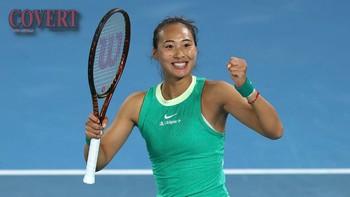
Why did Chinese tennis player Zheng Qinwen respond to a slur assertively?
Ding Gang
China’s Zheng Qinwen defeated her old rival, Donna Vekic, in a rematch of their Olympic final on Monday, advancing to the US Open quarterfinals. During the match, some spectators shouted the racially discriminatory English slur “yellow banana.” With unwavering courage, Zheng boldly responded, “I will beat you!”
Why did Zheng feel offended? In the modern context, this term carries strong racial discrimination connotations.

The metaphor originated in mid-20th century Asian American communities, particularly among Chinese Americans. “Banana” implies being “yellow on the outside, white on the inside,” referring to someone who is ethnically Asian but culturally more Western or “white.” It reflects the struggles of second and third-generation immigrants caught between their ancestral and mainstream Western cultures.
This concept isn’t unique to Asian communities. Similar terms exist for other cultures, like “coconut” (brown outside, white inside) for South Asians or Latinos and “Oreo” for African Americans.
When “yellow banana” first became popular in Asian communities, it often carried a self-deprecating or humorous tone. However, over time, it has become an offensive racial descriptor. It suggests a “split” between a person’s appearance and internal cultural identity, making them feel like an “outsider” caught in the middle.
The metaphor suggests that even if someone of Asian descent excels in a certain activity or field, they may not be fully accepted or recognized because of their cultural background. This is especially common in situations where someone is participating in activities that are traditionally associated with Western culture, such as tennis, which is often seen as a “Western game.”
Once upon a time, the tennis circle was like an old Western “club.” Suddenly, young players from the East “burst in like a whirlwind.” At the traditional Western dance, Eastern melodies began to play, disrupting the familiar rhythm of this ancient club.
Zheng’s success undoubtedly challenges some people’s traditional sense of superiority.
In today’s globalized world, cultural clashes are like different spices mixed, sometimes creating beautiful flavors but also potentially causing discomfort. Some people may choose to belittle others to maintain their psychological balance. This behavior reveals a clinging to the notion of white supremacy.
In the increasingly complex global political landscape, shouting the slur on the court is discrimination against the identity of Chinese athletes. Zheng’s success is a personal victory and an important demonstration of Chinese presence on the global sports stage, akin to Yao Ming’s brilliant performance in the NBA.
“They are on the field!” They come from the East and are not just two or three individuals but a group demonstrating skills as high as those of American and European athletes in many events. This is unprecedented in the world of sports and the Olympic arena.
The outstanding performance of Chinese athletes on the world stage stems from the momentum released by China’s reform and opening-up. Today, China has tens of thousands of tennis courts. Although China’s tennis courts still need to be expanded, it represents significant progress compared to the past.
China has established a systematic youth tennis training system starting from the grass-roots level to discover and nurture talent. With the facilities, investment, and more young people loving the sport, it’s no surprise that Chinese athletes are stepping onto the podium.
The essence of sports competition lies in fair play and the display of individual abilities, not racial or cultural superiority. Zheng’s assertive response effectively answers why she can rise to the top of the global tennis scene.
When Westerners can watch international competitions, which they have historically dominated, with a more open mind-set and appreciate the new perspectives and styles brought by athletes from different cultural backgrounds, it will signify their true acceptance of globalization. This globalization doesn’t belong solely to the West.
The writer is a senior editor with People’s Daily, and currently a senior fellow with the Chongyang Institute for Financial Studies at Renmin University of China
